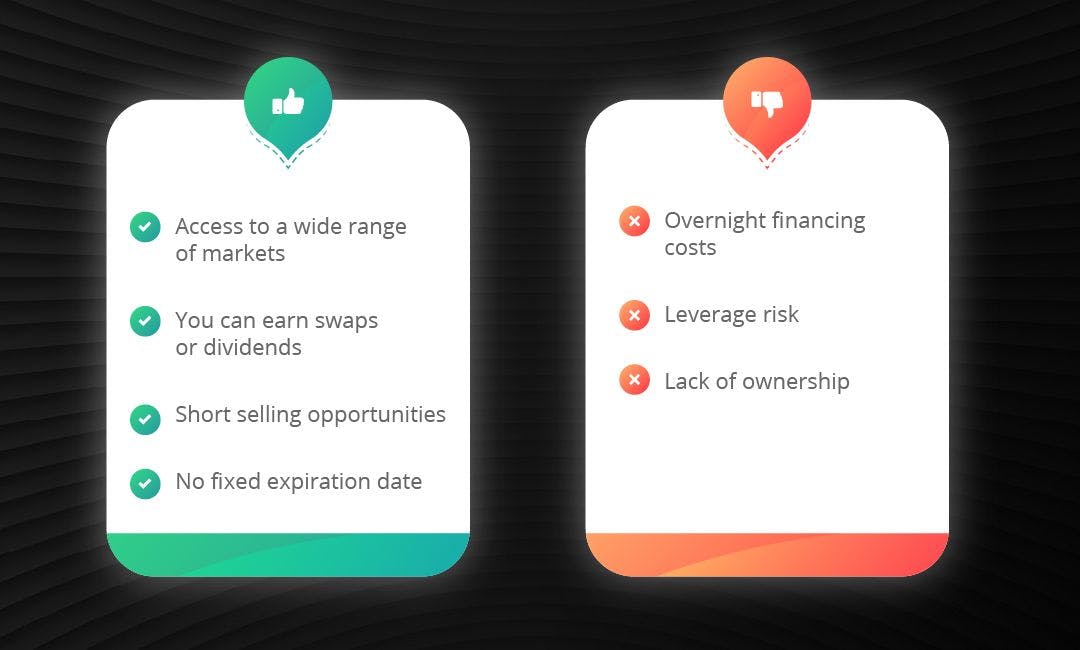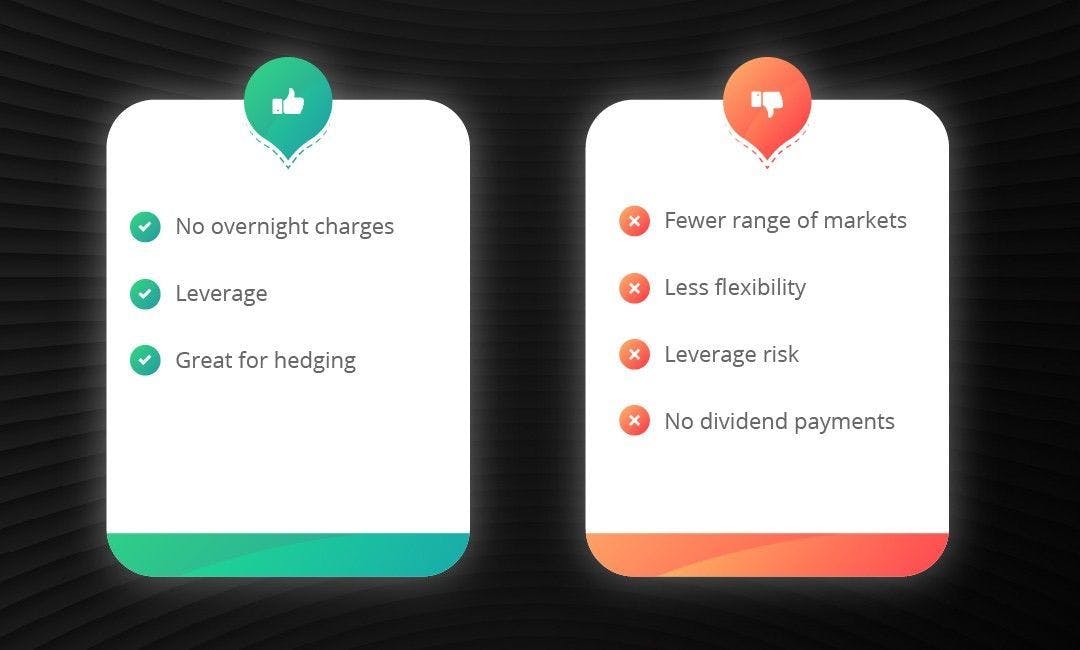CFD vs Futures | What is the difference? What is better to trade?
BY Chris Andreou
|พฤศจิกายน 24, 2566CFD vs Futures trading provides two avenues for traders, each with their own unique characteristics. Yet they cater to different kinds of traders due to their distinctive features and benefits.
Both avenues are derived from underlying financial assets that are highly popular for speculating on future price movements. With varied potential for profit and loss.
This is why traders often ask the question, CFD vs Futures, what are the differences and what is better to trade?
In this article, we'll explore their benefits, drawbacks, and delve into the factors that might make one a more suitable choice than the other.
Whether you are a beginner trader or looking to make the switch to Futures trading, this guide will help inform your decision making.
Keep reading to learn more.
CFDs vs Futures
Both of these forms of trading have their own unique set of features that impact how they function and the benefits provided to traders. Which can have a significant difference in your trading experience.
Let's start with a brief overview of each form of trading and then compare the CFD vs Futures contracts.
What are CFDs?
A CFD, which is an acronym of Contract For Difference is a financial instrument that allows traders to speculate on the price movement of an underlying asset without actually owning the asset itself. For example, to speculate on the price of Apple stock without physically owning the shares.
In a CFD transaction, the trader and the counterparty agree to exchange the difference between the buy and sell price.
Let's look at an example;
If you bought 1 Apple CFD at $150 and the price rises to $200 and you sell. Then the counterparty to your trade would pay you the difference of $50. However, if the price went down to $100 and you sell. You have to pay the counter party the $50 difference between the buy and sell price.
Advantages of CFD trading
Essentially, CFDs are derivative products that let traders benefit from accurate price predictions and have many advantages. Such as;
Leverage
Trading CFDs typically involves the use of leverage, which allows traders to open positions with a relatively small amount of capital.
Access to a wide range of markets
CFD trading allows you to speculate on price movements across various asset classes. Such as Forex, stocks, indices and commodities, all from a single trading account.
You can earn swaps or dividends
Although you will not own the underlying asset when trading CFDs, you could still be eligible to receive positive swaps when trading Forex. Or the dividend payments wherever they are applicable for stocks and indices.
Short selling opportunities
You can also take advantage of price declines by short-selling using a CFD. Allowing you to potentially profit from falling markets.
No fixed expiration date
CFDs do not have a fixed expiration date, which can provide more flexibility to close the trades at any time.
Disadvantages of CFD trading
However, these benefits also come with some disadvantages.
Overnight financing costs
Holding CFD positions overnight typically incurs financing charges for stocks and swaps for other markets. These fees can accumulate and reduce the potential profits. Especially when positions are held for longer periods of time.
Leverage risk
Although the use of leverage was mentioned as a benefit to CFD trading. Over leveraging your account also increases risk. Leverage is like a two way street, it can amplify your profit potential and also amplify and speed up the risk loss.
Lack of ownership
You will not own the underlying asset when trading CFD's. Which could be a disadvantage to those who prefer to receive some of the benefits that come with asset ownership. For example, you won't have any voting rights in the case of trading stock CFD's. As you won't be taking physical delivery of currency when you exchange it, you won't be able to spend it.
In summary, CFDs are versatile financial instruments that offer traders the opportunity to speculate on a diverse range of assets with leveraged positions.

Now, let's juxtapose the CFD vs Futures.
What are Futures contracts?
A futures contract is an agreement between two parties to buy or sell a specific quantity of an underlying asset at an agreed price. With the transaction set to take place on a specified future date.
Futures contracts usually involve the actual transfer of the assets when the transaction is set to take place unless the position is closed prior to the expiration. Trading futures on TIOmarkets platform will not include the transfer of the assets. The deals will expire without any transfer taking place.
Advantages of Futures trading
Futures are very popular among businesses seeking to hedge their price risk on raw materials, such as commodities or other financial instruments.
No overnight charges
There are no financing fees or swaps involved in holding a futures position overnight.
Leverage
You can trade Futures with the use of leverage, which allows traders to open positions with a relatively small amount of capital.
Great for hedging
Futures contracts can be highly effective for hedging, because you can trade them long or short and there are no overnight charges for holding the position. Which means you can hedge against price risk without incurring additional ongoing charges.
Disadvantages of Futures trading
However, there are some notable disadvantages when trading futures
Fewer range of markets
The Futures market is large but not as large as the CFD trading. At the time of this writing, you can trade the Dow Jones, Nasdaq 100, S&P 500 and the German DAX as futures contracts. More may be added in the future.
Less flexibility
Futures contracts come with a fixed expiry date, which can limit some trading strategies, especially the longer term ones. Because you will have to open a new position once the contract expires.
Leverage risk
Although you can use leverage when trading futures with TIOmarkets, it's important to remember the risks. Over leveraging your account can amplify and speed up the risk loss.
No dividend payments
Since futures contracts are agreements to buy or sell the underlying asset at a future date and do not involve actual ownership, they do not directly receive dividends.
In summary, futures contracts are powerful financial tools that cater to a large diverse market audience. They provide opportunities for hedging, speculation, and portfolio diversification.

CFD vs Futures, what are the differences?
Both CFDs and futures are derivative products where you can speculate on price movements. With CFD's, you do this without actually owning the underlying asset. With futures, you would expect to take delivery unless the position is closed before the expiry date. However, futures contracts will expire on TIOmarkets trading platform without including any transfer of the underlying asset. So in this regard, futures trading is very similar to CFD trading.
The key difference between CFD vs Futures trading with TIOmarkets is that futures contracts expire. While CFD contracts do not have any expiration date.
The fees involved in holding CFD positions overnight for extending periods of time can accrue swaps and financing charges. Even though you have the opportunity to earn the swap in some cases with a CFD, no such thing is applicable to futures trading. With futures trading, there are no dividends, swaps or overnight financing charges involved.
So the difference between CFD vs Futures trading is mainly about intent. CFDs may be more suitable for general short to medium term trading. Because there is a wide range of markets and instruments available. Whereas futures trading may be preferred for longer term holding.
What is better to trade, CFD or Futures?
Choosing between CFD vs Futures depends on your trading objectives, time horizons and risk appetite. As each instrument possesses its own unique set of benefits. Short-term traders and speculators may find CFDs more appealing.
CFD's are designed primarily for short-term trading and speculating on price movements. They enable traders to trade on margin, which can amplify both potential gains and losses. CFDs do not have a fixed expiry date, providing flexibility to close positions at any time.
Futures contracts are more appropriate for traders looking to hedge their positions and long-term trading. The fees associated with futures are generally less compared to trading CFD's when holding positions for extended periods of time. However, the range of markets available is limited.

Risk disclaimer: CFDs are complex instruments and come with a high risk of losing money rapidly due to leverage. You should consider whether you understand how CFDs work and whether you can afford to take the high risk of losing your money. Never deposit more than you are prepared to lose. Professional client’s losses can exceed their deposit. Please see our risk warning policy and seek independent professional advice if you do not fully understand. This information is not directed or intended for distribution to or use by residents of certain countries/jurisdictions including, but not limited to, USA & OFAC. The Company holds the right to alter the aforementioned list of countries at its own discretion.
Join us on social media

Experienced independent trader
Related Posts
undefined



